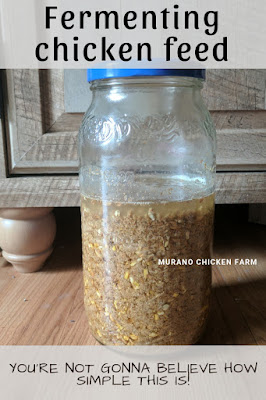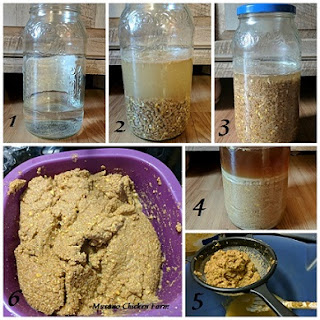I had bought my usual stack of bags of layer pellets from the feed store and one of them was about half feed dust. This chicken feed dust was accumulating in the bottom of the feeders, largely getting ignored, and basically being wasted. I started looking for ways to feed it to the chickens since I'm frugal and I didn't want to throw it out.
What started out as looking for chicken feed mash recipes, ended up being a fermented feed experiment!
The best part is that along the way I learned so much about fermenting feed and why it's good for chickens, in fact...better than regular feed!
Why ferment chicken feed?
- The fermenting process creates probiotics which is the healthy bacteria we need. I buy and feed my chickens yogurt for this reason and by fermenting feed for them I could cut this expense.
- Fermenting chicken feed makes the vitamins, minerals and proteins more bioavailable to them. Since half of my flock are guineas and they need extra protein, this would be a welcomed addition to their diets.
- Fermented feed is easier for the chickens to digest which causes them to eat less feed.
- Feeding fermented feed increases egg size, weight and shell thickness.
- Chickens eat about half the amount of feed when it's fermented versus when its dry, which makes a great impact on the feed bill.
- It's a great way to use up the powdered feed that's in the bottom of the bags that no one ever seems to eat.
Basically, just like fermented foods have health benefits for people, they're healthy for chickens too! Now that I actually knew all the benefits I needed to give it a try. Luckily the process is simple.
How to ferment chicken feed
It's extremely easy to ferment chicken feed, you just need a jar, feed and water. I used a giant glass pickle jar but any large jar with a lid will do. I'd choose carefully if you use plastic for this because the fermenting process may cause chemicals to leach out of the plastic. I'd be worried since chickens are so small it wouldn't take much to affect them.If you do use plastic make sure it's BPA free.
1) If your water is chlorinated let it sit out a day for the chlorine to evaporate. (chlorine kills bacteria and we're trying to create bacteria here) Use enough water to cover the feed by almost double. The feed will absorb the water and expand, but you want it to always be under the water. You don't want it exposed to the air, that will cause it to start spoiling.
2) Add the feed. I used layer pellets and a little bit of cracked corn. Cover loosely. Store in a dark, cool place. I set mine on the floor in the corner of my kitchen.
3) Stir at least once daily and add more water if needed so the feed remains about an inch below the water surface. You should start to see some foamy bubbles on top. This means the fermenting process is taking place. Just mix those in.
4) At day three it's ready. Scoop it out and let it drain a bit, then serve to the chickens.
5) I pour some of the liquid back into the jar and add more water and feed to start another batch. I've read that if you reuse the liquid like this it takes less time to make, but 3 days seems to still be ideal for me.
Some interesting points: If at any time it starts to smell really bad or mold forms then just toss it out. If you wait too many days before feeding it to the chickens it goes from that sweet/sour taste they like to a very strong/sour that they won't eat.
You do not need to add a starter to get the feed to start fermenting. Some people add apple cider vinegar to get it started more quickly but I found it to not be necessary.
Many people choose to feed this daily. I'm more of a moderation person so I feed it every 2-3 days. I have one flock that won't touch it but the rest go absolutely crazy for it.
I've noticed an increase in egg production (it's winter too!) since I started fermenting feed a little over a month ago.
Related reading: How to Feed a Scoby to Chickens.
I also haven't found any of those paper thin eggs my one hen is so fond of laying which is awesome because I break those all the time! I'll definitely continue feeding them fermented feed. It's better for them, they seem to love it and it's easier on my feed bill!
In fact, it became one of the reasons I saved $450 on my feed bill last year!
~L
Want information on raising chickens sent right to your email weekly? Click right here to join my list and get new posts sent directly to you the day they're published. You'll also get the free download 25 Ways to save money raising chickens.




Do you have any feeding amounts? 1 pound feeds 'X' number of chickens?? Also I have a gravity feeder do you put this fermented feed out in a flat feeding dish?
ReplyDeleteI didn't measure it, but that large pickle jar starts off about 1/3 of the way full and feeds my 3 coops which is about 50 chickens and guineas. I have gravity feeders too but I put the fermented feed on a flat dish or in a regular bowl.
Delete~L
My girls love their fermented feed! We do it everyday because it actually increases the nutrients that they receive, which makes them require less feed! Thanks for sharing on the Homesteader Hop!
ReplyDeleteSo funny, I actually just recently wrote about this on my blog too! We do ours a little differently, but it's amazing how much you save on feed, how much less they eat, and even their poop is less stinky! (We did change their feed to our own mix instead of store bought, though. :P)Thanks for sharing on the Homesteader Hop.
ReplyDeletePlease share your feed mix. I don't like the idea of commercial feed.
DeleteWe fed fermented feed to our meat birds and let me tell you, I was never so impressed with a feed source. Our meat birds actually processed the food they ate instead of pooping it all out. Best batch of meat birds we ever raised and they were so much healthier!!!
ReplyDeleteOh wow that's awesome! (sorry, I just saw this!) I will definitely try fermented feed for my meat birds next spring. Thanks for the tip!
DeleteLisa
Have you fermented chick starter? I have 6 chicks that are about 2 weeks and want to ferment their feed. But not sure if I should wait.
ReplyDeleteI have not tried fermenting chick starter. I can't think of any reasons why it would be bad for them...in fact, it should be healthier for them. Let me know how it goes if you decide to try it.
DeleteLisa
I have and they LOVE it! I mix a scoop of rolled oats and a scoop of their chick starter and re-using the liquid from the first batch, it only takes overnight now (it's summer out and the house is a bit warmer). Not sure if I'm saving feed or not, as they gobble it all right up, but probably I am, as they can't scratch this stuff out of their food dish. When I do give them the regular dry starter now, they sort of look at it like Meh, that ld stuff again?! Lol
DeleteThanks for the fermented chick starter recipe! I'll definitely make some for my next set of chicks!
DeleteLisa
Another great article. Is it possible for you to add a printer friendly button?
ReplyDeleteI will see if I can find an option for that!
DeleteLisa
I just printed the whole article like it was , top right corner an arrow pointing up and go to print 👍
DeleteNot sure what I did wrong. But I covered with water, stirred it, put the lid on and within 24 hours it was leaking out the top and oozing onto my floor with a rotting vegetable smell. 😞
ReplyDeleteHow full was your jar? It needs a good amount of space because it does expand a bit. Also, make sure the water covers the feed, or else it can get moldy and rancid.
DeleteLisa
I just got my new flock, there about 2 to 3 weeks old. I want to start them on fermenting feed, I saw a post above saying they tried this with baby chicks and wondered if the oat meal she added was ground up or just from the box. Starting new starter how long did it take to ferment. Is she still happy with results, thanks!
ReplyDeleteSo you feed this as a supplement? Do you still have dry food available for them? I am going on my 3rd year with chickens and still learning every day. We have 7 hens that are between 1 and 3 years old with 5 chicks from this spring. They do get to free range about 3 days a week. Also, can you make ahead and store in frige once it is fermented?
ReplyDeleteYes, I give it to the flock in addition to their regular feed...though they pretty much ignore their dry feed when the fermented feed is out! Unfortunately you cannot store fermented feed as it will get funky after a few days and then they won't want to eat it. It's best served fresh.
DeleteLisa